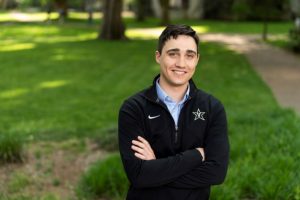Nick Prendergast knew that he wanted to return to Washington, D.C., to work when he chose Vanderbilt as his law school. The Rhode Island native had earned his undergraduate degree at The George Washington University. “I love the D.C. area, but I wanted to experience living in another part of the country,” he said.

Nick is a first-generation law student, and he also wanted a law school where he could get to know many of his classmates and benefit from a more supportive environment. “Vanderbilt’s small size was a huge selling point, because I knew a smaller institution would be a better learning environment for me,” he said.
Nick confirmed his interest in practicing law as a GWU undergraduate by interning at the U.S. Attorney’s Office in D.C. When he discussed choosing Vanderbilt for law school with D.C.-based attorneys he knew, their high opinion of the school helped cinch his decision. “They were very high on Vanderbilt and assured me that they recruited Vanderbilt law grads,” he said.
After his 1L year, Nick cultivated his interest in a career in litigation by interning at the Rhode Island Office of the Attorney General, where he was assigned to the Office of the Civil Rights Advocate. He enjoyed his summer job at Simpson Thacher & Bartlett in D.C. after his 2L year and plans to join the firm after graduation. “Last summer I focused solely on litigation, working primarily on national security regulatory matters and government investigations, as well as on matters involving foreign investments and assets. I’m looking forward to working in these areas when I get back to the firm,” he said.
Nick joined the staff of the Vanderbilt Law Review as a 2L and has served as the journal’s senior managing editor his 3L year. This spring, second-year staffers selected him for the Law Review Candidate’s Award, which honors the third-year staff member, other than the editor in chief, who made the most significant contribution to their development as journal staff members. His Note, “Policing, Masculinities, and Judicial Acknowledgment,” was published in the Law Review this spring.
Nick also volunteered to mentor junior students through the law school’s Co-Counsel and 1Levate programs. “I think Co-Counsel is one of the best programs at the law school, and it’s been the centerpiece of my extracurricular activity,” he said. “I came to Vanderbilt because I was impressed with its sense of community and quickly found a home here. I wanted people like me—first-generation law students—to feel as comfortable and supported as I did.”
Nick found his classes challenging and relished Vanderbilt’s intellectual environment. “I’ve had extraordinary professors who were experts in their fields—Lisa Bressman for Administrative Law, Jennifer Bennett Shinall for Employment Law and Employment Discrimination, and Jessica Clarke for Civil Procedure and Gender and the Law. He also served as a research assistant to Professor Clarke as a 2L and 3L and took her Antidiscrimination Seminar during his 3L year. “She is an outstanding professor and a trailblazer in the field of gender and equality law. Learning from her was one of the highlights of law school,” he said of Clarke. As a 3L, Nick was also a student in the Youth Opportunity Clinic taught by Professor Cara Suvall.
At graduation Nick was a class marshal and was recognized with the Chris Lantz Award for his contributions to the VLS community. “Vanderbilt’s community was the single most important aspect of my law school experience, and I also found an intellectual haven here. I’ll have no problem sending my kids to Vanderbilt—that’s how much I’ve enjoyed my time here,” he said.